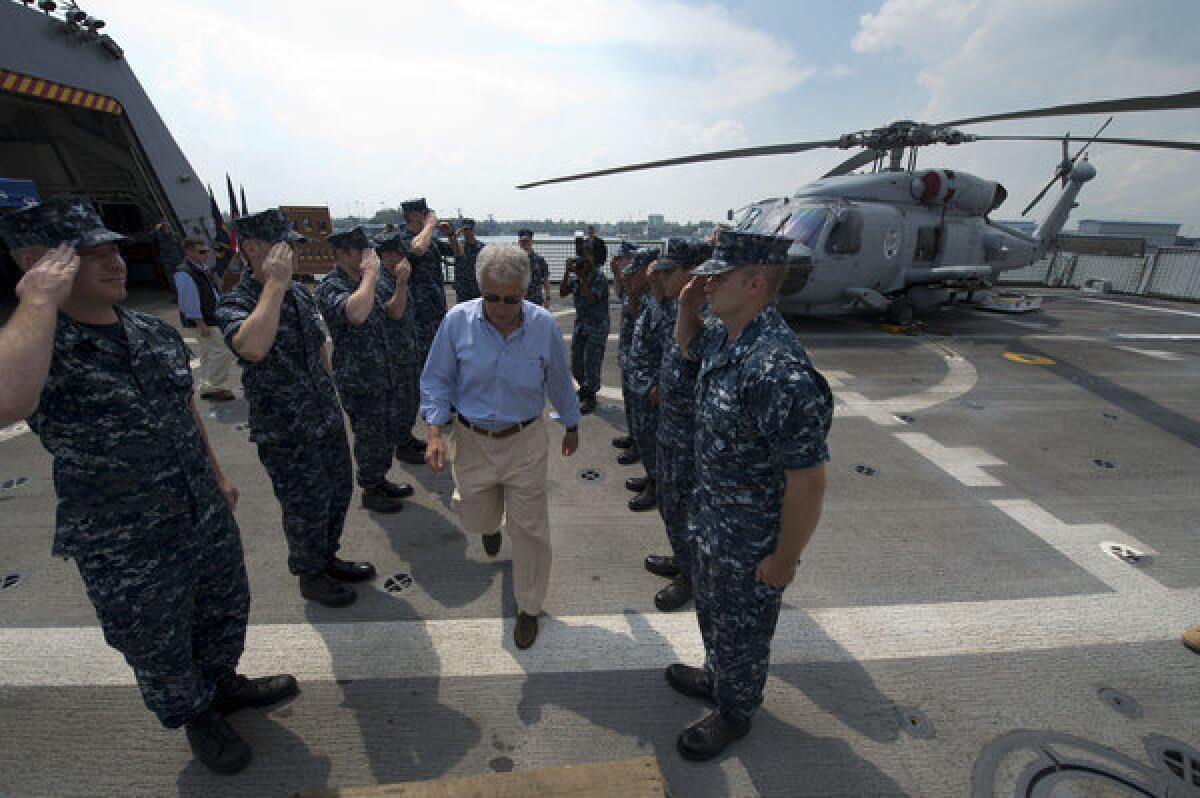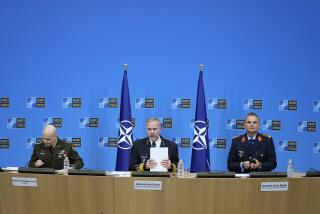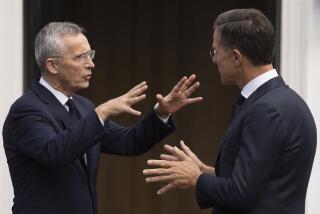Hagel, NATO counterparts to discuss possible training role in Libya

BRUSSELS — U.S. Defense Secretary Chuck Hagel is expected to consult with his European counterparts this week about a possible North Atlantic Treaty Organization role training Libyan security forces as he attends his first meeting of the alliance’s defense ministers, senior Pentagon officials said.
Also scheduled to be discussed Tuesday and Wednesday in Brussels are defending against cyber warfare and planning for the departure of combat troops from Afghanistan at the end of next year.
Syria’s civil war and the government’s chemical weapons are not on the formal agenda but are expected to come up, the officials said, speaking under ground rules that do not allow them to be identified.
Hagel is in the midst of some of his most intensive consultations with allies since he became Pentagon chief in February.
He flew to NATO’s Belgium headquarters Monday from Singapore, where he spent two days meeting with Asian defense officials at an annual security conference. He will have met with 20 senior government ministers by the time he flies back to Washington on Wednesday night, officials said.
Libyan Prime Minister Ali Zidan visited NATO headquarters a week ago and asked that the alliance consider helping Libyan forces, the officials said. NATO Secretary-General Anders Fogh Rasmussen discussed the possible Libyan mission at an Oval Office meeting Friday with President Obama.
“Part of where we think we can be helpful is to ensure that a democratically elected Libyan government has the capacity to control its borders and ensure that it does not become a safe haven for terrorism,” Obama said after the meeting. “And I think NATO has an
important role to play on that front.”
The training would not necessarily take place on Libyan soil, a senior defense official said, and would not have to involve Americans. Parts of Libya are still considered extremely dangerous for U.S. personnel, including Benghazi, where the U.S. ambassador and three other Americans were killed in September in an attack on the U.S. mission.
The United States has not reestablished a formal diplomatic presence in Benghazi, though it maintains its embassy in the Libyan capital, Tripoli.
NATO defense ministers also will be undertaking early, conceptual planning for how to shape their training and assistance mission in Afghanistan after 2014, a second senior defense official said.
At a previous ministers meeting, NATO agreed to a goal of maintaining about 8,000 to 12,000 troops in Afghanistan after the withdrawal of combat forces, but the specifics of each nation’s contributions have not been ironed out. Those figures do not include terrorist-hunting U.S. special operations forces, which operate clandestinely.
“The defense ministers are basically talking about a game plan, a concept on the way forward,” the official said.
“Theoretically you could have a very minimal presence, you could have a big presence, you could have a presence concentrated in urban areas, you could have it spread out to rural areas,” he added. “The mission is known, but how you would perform the mission” is under review.
So far this year, Taliban militants have aggressively targeted Afghan security forces, and the army and police “have done a very good job of standing up to the Taliban,” the official said.
On cyber security, NATO staff have been working on a series of proposals for how the alliance can improve the way it defends military networks, as well as the commercial networks that support militaries, the officials said.
The issue of economic espionage through cyber attacks -- the theft of intellectual property from Western countries via cyber intrusions that often come from China -- is not expected to be discussed because it is not a military issue, the officials said.
On Syria, NATO ministers will continue to explore ways to secure Syria’s chemical weapons if President Bashar Assad is ousted by rebel forces, the officials said. They would not get into specifics.
The Obama administration has avoided playing any overt military role in Syria’s civil war.
ALSO:
China poultry plant fire kills 119
A German mouthful bites the dust
The Week Ahead: Syria festers, Cuba connects, China’s Xi tours
More to Read
Sign up for Essential California
The most important California stories and recommendations in your inbox every morning.
You may occasionally receive promotional content from the Los Angeles Times.











